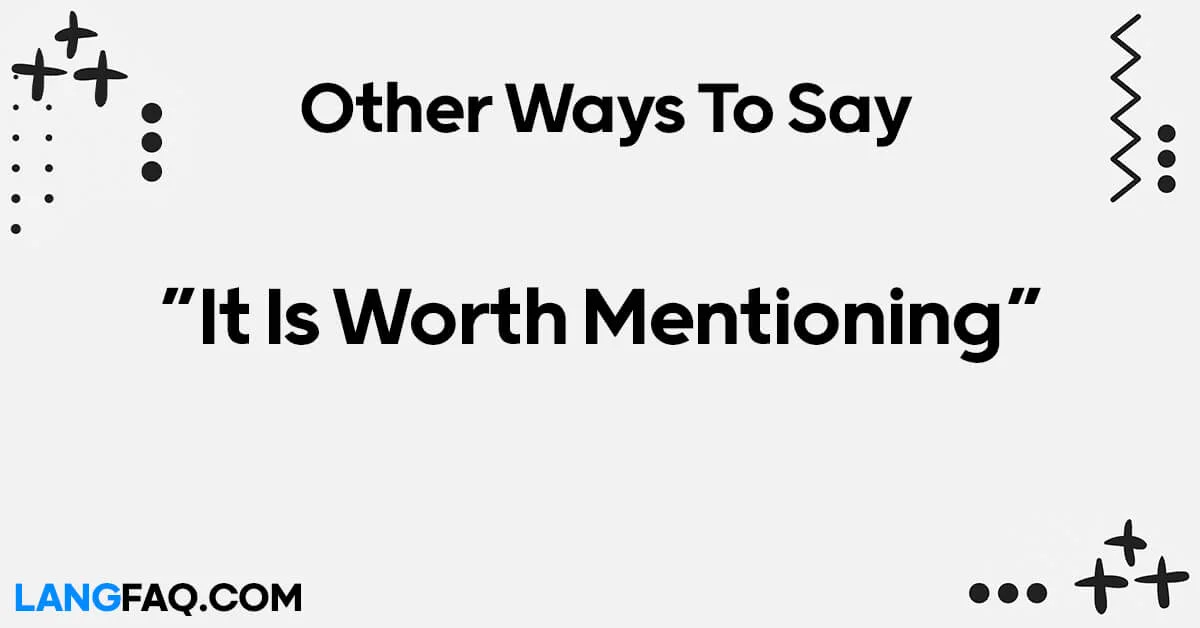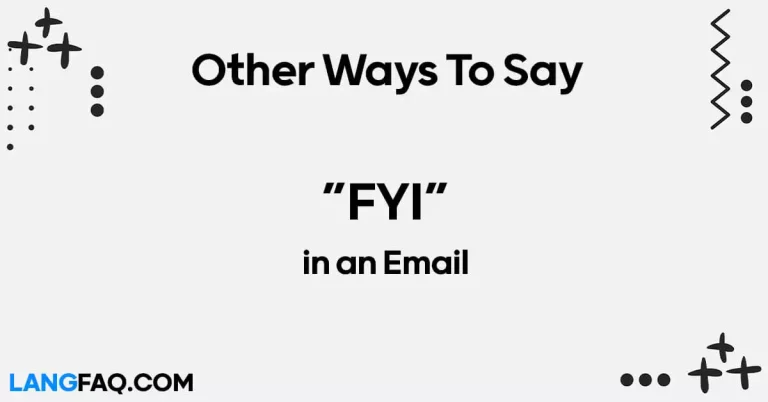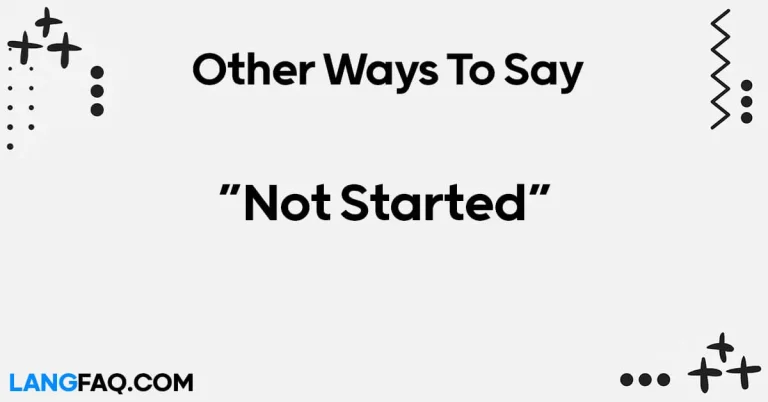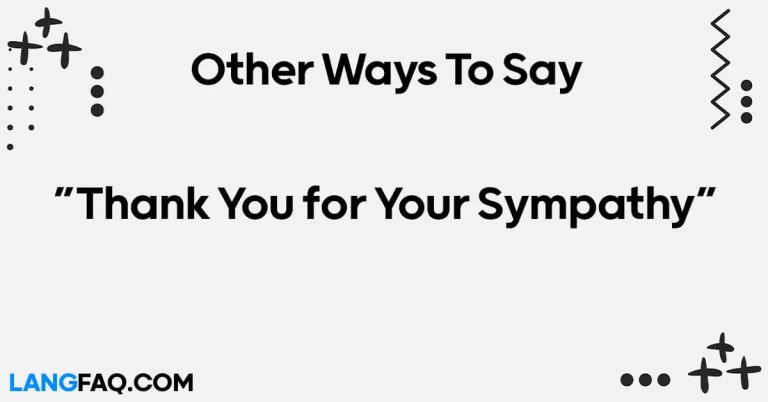In communication, finding diverse ways to express ideas is crucial for clarity and impact. When it comes to emphasizing the significance of a point, the phrase “It Is Worth Mentioning” often serves as a go-to. However, expanding your repertoire of expressions can greatly enhance your communication skills. In this article, we delve into 12 alternative phrases that effectively convey the same meaning, offering you a variety of options to enrich your vocabulary and express yourself more eloquently.
12 Other Ways to Say “It Is Worth Mentioning”
Here are 12 alternative phrases to express the idea of “It Is Worth Mentioning”:
- It’s worth noting
- Just a quick heads up
- One should bear in mind
- It’s important to highlight
- I’d like to point out
- It deserves a mention
- I want to draw attention to
- Let me emphasize
- It’s essential to bring up
- It merits a special mention
- It’s noteworthy that
- I feel compelled to mention
Here’s a table with meanings and examples for the alternative phrases to express “It Is Worth Mentioning”:
| Phrase | Meaning | Example |
|---|---|---|
| It’s worth noting | Indicates importance or significance | It’s worth noting that the deadline is approaching. |
| Just a quick heads up | Informal way to share important information | Just a quick heads up, the meeting has been rescheduled. |
| One should bear in mind | Encourages consideration or remembrance | One should bear in mind the potential risks involved. |
| It’s important to highlight | Emphasizes significance or importance | It’s important to highlight the key findings of the study. |
| I’d like to point out | Draws attention to specific information | I’d like to point out the errors in the report. |
| It deserves a mention | Suggests recognition or acknowledgment | The team’s effort deserves a mention in the presentation. |
| I want to draw attention to | Highlights a particular detail or aspect | I want to draw attention to the safety precautions. |
| Let me emphasize | Signals intent to stress or underscore | Let me emphasize the importance of time management. |
| It’s essential to bring up | Indicates necessity to discuss or mention | It’s essential to bring up the budget constraints. |
| It merits a special mention | Indicates something noteworthy or commendable | His dedication merits a special mention. |
| It’s noteworthy that | Highlights something worthy of attention | It’s noteworthy that the company achieved record sales. |
| I feel compelled to mention | Indicates a strong urge to bring up | I feel compelled to mention the recent developments. |
In summary, these alternative phrases offer various ways to convey the idea of “It Is Worth Mentioning,” allowing for flexibility and nuance in communication. Whether you’re emphasizing significance, drawing attention to specific details, or urging consideration, these phrases enrich your language repertoire and enhance your ability to express ideas effectively.
Is It Correct to Say “It Is Worth Mentioning”?
Yes, “It is worth mentioning” is a correct and grammatically appropriate phrase in English. It is commonly used to suggest that something is deserving of being brought up or mentioned. This phrase indicates that the information or topic being referred to holds value or importance and should be included in the conversation or discussion. It is often employed to introduce additional points or details that may contribute to the overall understanding or relevance of the subject at hand. Overall, “It is worth mentioning” is a valid expression used to highlight the significance or relevance of a particular piece of information.
Professional Mail Example With “It Is Worth Mentioning”
Subject: Important Update: New Project Milestones
Dear [Recipient’s Name],
I hope this email finds you well. I wanted to reach out to provide you with some important updates regarding our ongoing project.
Firstly, I’d like to highlight the progress we’ve made over the past few weeks. Thanks to the dedicated efforts of our team, we’ve successfully completed the initial phase of the project ahead of schedule. This achievement is a testament to everyone’s hard work and commitment to excellence.
Additionally, it is worth mentioning that we’ve identified some key opportunities for optimization in our processes. By streamlining our workflows and implementing efficient strategies, we believe we can further enhance our project outcomes and deliver even greater value to our clients.
Furthermore, I wanted to bring to your attention a change in the upcoming project milestones. Based on recent feedback from our stakeholders, we’ve adjusted the timeline to accommodate their needs and ensure alignment with project objectives. Rest assured, these adjustments have been carefully considered to maintain the quality and integrity of our deliverables.
As always, open communication is essential for the success of our project. If you have any questions or concerns regarding these updates, please don’t hesitate to reach out to me directly. Your input is highly valued, and we welcome any feedback you may have.
Thank you for your continued dedication and support. Together, I am confident that we will achieve great success with this project.
Best regards,
[Your Name] [Your Position] [Your Contact Information]
It’s Worth Noting
When you want to subtly draw attention to a significant point or detail, “It’s Worth Noting” is an excellent phrase to use. This expression implies that the information being mentioned holds value and deserves consideration. Whether you’re speaking in a formal setting or having a casual conversation, incorporating this phrase adds clarity and emphasis to your message.
Meaning and Usage:
“It’s Worth Noting” is used to highlight information that is relevant or important in a given context. It serves as a gentle reminder to the listener or reader to pay attention to the mentioned detail.
Examples:
- Formal Context: In a business meeting, you might say, “Before we proceed, it’s worth noting that our sales figures have exceeded expectations this quarter.”
- Informal Context: During a friendly discussion, you could mention, “Hey, it’s worth noting that the new restaurant downtown has amazing reviews.”
Variations:
- Colleagues: “I’d like to point out” or “Let me draw your attention to”
- Friends: “Hey, check this out” or “Just a heads up”
- Mentor-Mentee: “I want to highlight” or “It’s important to mention”
Dictionary Insights:
According to Cambridge Dictionary, “worth noting” means “to be important to think about or remember.”
Pros and Cons:
- Pros: Conveys importance effectively, adds emphasis to key points.
- Cons: May come across as slightly formal in very casual conversations.
Related Grammar/Usage Rules:
- Use “It’s Worth Noting” followed by a comma and then the information you want to highlight.
- Can be used at the beginning or middle of a sentence.
Tips:
- Use “It’s Worth Noting” sparingly to avoid overemphasizing minor details.
- Ensure the information being highlighted is genuinely relevant to the conversation or topic at hand.
Sample Email Snippet:
“Dear Team,
Before we kick off today’s meeting, it’s worth noting that we’ve received positive feedback from our recent client survey. Let’s discuss how we can leverage this momentum to drive further success.
Best regards, [Your Name]”
Incorporating “It’s Worth Noting” into your communication repertoire allows you to subtly emphasize important information without being overly forceful or blunt. Whether you’re navigating professional interactions or casual conversations, this phrase serves as a valuable tool for effective communication.
Just a Quick Heads Up
When you need to inform someone about important information in a casual and friendly manner, “Just a Quick Heads Up” is the perfect phrase to use. This expression signals that you have something noteworthy to share without sounding too formal or imposing. Whether you’re sending an email to a colleague or chatting with a friend, using this phrase adds a touch of informality while ensuring that the message gets across effectively.
Meaning and Usage:
“Just a Quick Heads Up” is used to inform someone about something important or relevant in a brief and informal manner. It’s often used to preface a piece of information that the listener or reader should be aware of.
Examples:
- Formal Context: In a work email, you might write, “Just a quick heads up, the deadline for the project has been moved up by a day.”
- Informal Context: Texting a friend, you could say, “Hey, just a quick heads up, I’ll be running a bit late to dinner tonight.”
Variations:
- Colleagues: “Just wanted to let you know” or “Thought I’d give you a heads up”
- Friends: “Hey, FYI” or “Quick heads up”
- Mentor-Mentee: “Just a friendly reminder” or “Wanted to give you a heads up”
Dictionary Insights:
According to Cambridge Dictionary, “heads-up” is defined as “a warning, especially one that alerts someone to a danger or problem.”
Pros and Cons:
- Pros: Conveys information quickly and informally, suitable for both professional and casual settings.
- Cons: May be perceived as too casual in very formal contexts.
Related Grammar/Usage Rules:
- Use “Just a Quick Heads Up” followed by a comma and then the information you want to share.
- Keep the message brief and to the point.
Tips:
- Reserve this phrase for situations where you need to inform someone about something important but don’t want to come across as too formal or serious.
- Use it sparingly to maintain its impact and effectiveness.
Sample Email Snippet:
“Hi Team,
Just a quick heads up, the server maintenance scheduled for tomorrow has been postponed to next week due to unforeseen circumstances. Please adjust your schedules accordingly.
Thanks, [Your Name]”
Incorporating “Just a Quick Heads Up” into your communication toolkit allows you to inform others about important information in a friendly and approachable manner. Whether you’re interacting with colleagues, friends, or mentees, this phrase helps ensure that your message is received and understood effectively.
One Should Bear in Mind
When you want to encourage someone to remember or consider a particular piece of information, “One Should Bear in Mind” is a sophisticated phrase to employ. This expression conveys a sense of importance and suggests that the information being shared is worthy of attention and consideration. Whether you’re speaking in a formal presentation or engaging in a one-on-one conversation, using this phrase adds gravity to your message and prompts listeners to give the information due thought.
Meaning and Usage:
“One Should Bear in Mind” is used to emphasize the importance or relevance of a particular piece of information. It encourages the listener or reader to remember or consider the information carefully.
Examples:
- Formal Context: During a business presentation, you might say, “One should bear in mind the potential impact of these policy changes on our stakeholders.”
- Informal Context: Discussing travel plans with a friend, you could mention, “One should bear in mind the weather forecast for our trip next week.”
Variations:
- Colleagues: “It’s important to remember” or “Let’s not forget”
- Friends: “Don’t forget” or “Keep in mind”
- Mentor-Mentee: “Remember to consider” or “Take into account”
Dictionary Insights:
According to the Oxford English Dictionary, “bear in mind” means “to remember or consider something, especially a piece of information when making a decision or giving advice.”
Pros and Cons:
- Pros: Conveys importance and encourages consideration, suitable for formal and professional contexts.
- Cons: May sound slightly formal or stiff in very casual conversations.
Related Grammar/Usage Rules:
- Use “One Should Bear in Mind” followed by the information you want to emphasize, typically at the beginning or middle of a sentence.
- Can be used to introduce a point or to reinforce a previous statement.
Tips:
- Reserve this phrase for situations where you want to underscore the importance of a particular detail or consideration.
- Use it selectively to maintain its impact and avoid sounding overly formal.
Sample Email Snippet:
“Dear Team,
As we move forward with the project plan, one should bear in mind the budget constraints outlined in our previous meeting. Let’s ensure that our strategies align with these financial considerations.
Best regards, [Your Name]”
Incorporating “One Should Bear in Mind” into your communication repertoire adds sophistication and gravitas to your message, prompting others to give important information the attention it deserves. Whether you’re addressing colleagues, friends, or mentees, this phrase ensures that key details are remembered and considered thoughtfully.
It’s Important to Highlight
When you want to emphasize the significance or relevance of a particular point, “It’s Important to Highlight” is a powerful phrase to use. This expression conveys the necessity of drawing attention to a specific detail or aspect, ensuring that it is not overlooked or dismissed. Whether you’re delivering a formal presentation or engaging in a discussion, incorporating this phrase adds clarity and emphasis to your message, compelling listeners to recognize the importance of the highlighted information.
Meaning and Usage:
“It’s Important to Highlight” is used to underscore the significance or relevance of a particular point or detail. It serves as a prompt to draw attention to important information that may otherwise be overlooked.
Examples:
- Formal Context: During a project review meeting, you might state, “It’s important to highlight the key milestones we’ve achieved so far.”
- Informal Context: Planning a gathering with friends, you could mention, “It’s important to highlight any dietary restrictions or preferences for the menu.”
Variations:
- Colleagues: “Let’s emphasize” or “We should focus on”
- Friends: “Let’s make sure to mention” or “We need to highlight”
- Mentor-Mentee: “It’s crucial to spotlight” or “We must draw attention to”
Dictionary Insights:
According to Merriam-Webster, “highlight” means “to draw special attention to.”
Pros and Cons:
- Pros: Conveys importance and urgency, prompts listeners to recognize the significance of highlighted information.
- Cons: May sound slightly formal in very casual conversations.
Related Grammar/Usage Rules:
- Use “It’s Important to Highlight” followed by the information you want to emphasize, typically at the beginning or middle of a sentence.
- Can be used to introduce a point or to reinforce a previous statement.
Tips:
- Reserve this phrase for situations where you want to ensure that important information is acknowledged and considered.
- Use it judiciously to maintain its impact and avoid overemphasizing minor details.
Sample Email Snippet:
“Hi Team,
As we prepare for the upcoming client presentation, it’s important to highlight the key features and benefits of our product suite. Let’s ensure that our messaging effectively communicates the value proposition to our audience.
Best regards, [Your Name]”
Incorporating “It’s Important to Highlight” into your communication toolkit allows you to underscore the significance of important information, ensuring that it receives the attention it deserves. Whether you’re addressing colleagues, friends, or mentees, this phrase helps ensure that key details are recognized and considered thoughtfully.
I’d Like to Point Out
When you want to draw attention to specific information or details, “I’d Like to Point Out” is a straightforward yet effective phrase to use. This expression signals your intent to highlight a particular point, ensuring that it receives the attention it deserves. Whether you’re speaking in a formal presentation or having a casual conversation, incorporating this phrase adds clarity and emphasis to your message, prompting listeners to focus on the highlighted information.
Meaning and Usage:
“I’d Like to Point Out” is used to direct attention to specific information or details that are relevant or important in a given context. It serves as a polite yet assertive way to draw focus to a particular point.
Examples:
- Formal Context: During a meeting, you might say, “I’d like to point out the discrepancy in the financial report.”
- Informal Context: Discussing a movie with friends, you could mention, “I’d like to point out the symbolism in the opening scene.”
Variations:
- Colleagues: “Let me highlight” or “Allow me to mention”
- Friends: “Check this out” or “Have you noticed”
- Mentor-Mentee: “I want to bring attention to” or “Let’s discuss this”
Dictionary Insights:
According to Lexico, “point out” means “to bring someone’s attention to something.”
Pros and Cons:
- Pros: Directs attention effectively, ensures important information is noticed.
- Cons: May sound slightly formal in very casual conversations.
Related Grammar/Usage Rules:
- Use “I’d Like to Point Out” followed by the information you want to highlight, typically at the beginning or middle of a sentence.
- Can be used to introduce a point or to reinforce a previous statement.
Tips:
- Use this phrase when you want to ensure that specific information or details are noticed and considered.
- Keep the message concise and focused to maintain clarity and impact.
Sample Email Snippet:
“Dear Team,
I’d like to point out the recent updates to our project timeline. Please review the revised schedule and let me know if you have any questions or concerns.
Best regards, [Your Name]”
Incorporating “I’d Like to Point Out” into your communication toolkit allows you to effectively direct attention to specific information or details, ensuring that they are noticed and considered. Whether you’re addressing colleagues, friends, or mentees, this phrase helps ensure that key points are recognized and understood thoughtfully.
It Deserves a Mention
When you want to acknowledge or recognize something noteworthy or commendable, “It Deserves a Mention” is a gracious phrase to use. This expression conveys appreciation and recognition for a particular aspect or accomplishment, ensuring that it receives the attention it deserves. Whether you’re speaking in a formal setting or having a casual conversation, incorporating this phrase adds warmth and positivity to your message, highlighting the importance of the recognized item.
Meaning and Usage:
“It Deserves a Mention” is used to express recognition or acknowledgment for something noteworthy or commendable. It serves as a polite and appreciative way to draw attention to a particular aspect or accomplishment.
Examples:
- Formal Context: In a presentation, you might state, “The team’s dedication throughout this project deserves a mention.”
- Informal Context: Chatting with friends, you could say, “Your support during a challenging time definitely deserves a mention.”
Variations:
- Colleagues: “Let’s recognize” or “I want to highlight”
- Friends: “Shoutout to” or “Big props to”
- Mentor-Mentee: “I’d like to commend” or “It’s important to acknowledge”
Dictionary Insights:
According to Merriam-Webster, “mention” means “to refer to; to cite formally.”
Pros and Cons:
- Pros: Conveys appreciation and recognition, fosters positivity and morale.
- Cons: May sound slightly formal in very casual conversations.
Related Grammar/Usage Rules:
- Use “It Deserves a Mention” followed by the aspect or accomplishment you want to acknowledge, typically at the beginning or middle of a sentence.
- Can be used to introduce a point or to reinforce a previous statement.
Tips:
- Use this phrase when you want to express appreciation or recognition for something noteworthy or commendable.
- Tailor the acknowledgment to the context to ensure it resonates with the audience.
Sample Email Snippet:
“Hi Team,
I just wanted to mention that the extra effort put in by the marketing team for the recent campaign definitely deserves a mention. Your creativity and dedication were truly impressive.
Best regards, [Your Name]”
Incorporating “It Deserves a Mention” into your communication toolkit allows you to express appreciation and recognition for noteworthy accomplishments or aspects. Whether you’re addressing colleagues, friends, or mentees, this phrase helps ensure that deserving efforts or achievements are acknowledged and valued.
I Want to Draw Attention To
When you want to bring focus to a particular detail or aspect, “I Want to Draw Attention To” is a direct and effective phrase to use. This expression signals your intent to highlight a specific point, ensuring that it receives the consideration it deserves. Whether you’re speaking in a formal presentation or having a casual conversation, incorporating this phrase adds clarity and emphasis to your message, prompting listeners to pay attention to the highlighted information.
Meaning and Usage:
“I Want to Draw Attention To” is used to direct focus to a particular detail or aspect that is relevant or important in a given context. It serves as a clear and assertive way to ensure that the highlighted information is noticed and considered.
Examples:
- Formal Context: During a project review, you might state, “I want to draw attention to the implications of this decision on our timeline.”
- Informal Context: Chatting with friends, you could mention, “I want to draw attention to the safety precautions for our upcoming hiking trip.”
Variations:
- Colleagues: “Let’s focus on” or “We need to highlight”
- Friends: “Check out this” or “I need to point out”
- Mentor-Mentee: “It’s important to note” or “I want to emphasize”
Dictionary Insights:
According to Merriam-Webster, “draw attention to” means “to cause people to notice.”
Pros and Cons:
- Pros: Directs attention effectively, ensures important information is noticed and considered.
- Cons: May sound slightly formal in very casual conversations.
Related Grammar/Usage Rules:
- Use “I Want to Draw Attention To” followed by the detail or aspect you want to highlight, typically at the beginning or middle of a sentence.
- Can be used to introduce a point or to reinforce a previous statement.
Tips:
- Use this phrase when you want to ensure that specific information or details are noticed and considered.
- Keep the message concise and focused to maintain clarity and impact.
Sample Email Snippet:
“Hi Team,
I want to draw attention to the updated guidelines for client communication. Please review the document and ensure that you’re familiar with the changes.
Best regards, [Your Name]”
Incorporating “I Want to Draw Attention To” into your communication toolkit allows you to effectively direct focus to specific information or details, ensuring that they are noticed and considered. Whether you’re addressing colleagues, friends, or mentees, this phrase helps ensure that key points are recognized and understood thoughtfully.
Let Me Emphasize
When you want to stress or underscore a particular point, “Let Me Emphasize” is a confident and assertive phrase to use. This expression signals your intent to highlight the importance or significance of a specific detail, ensuring that it receives the attention it deserves. Whether you’re delivering a formal presentation or engaging in a one-on-one conversation, incorporating this phrase adds weight and authority to your message, compelling listeners to recognize the emphasized information.
Meaning and Usage:
“Let Me Emphasize” is used to stress or underscore the importance or significance of a particular point or detail. It serves as a firm and assertive way to ensure that the emphasized information is noticed and given due consideration.
Examples:
- Formal Context: During a training session, you might say, “Let me emphasize the importance of adhering to safety protocols in the workplace.”
- Informal Context: Discussing travel plans with a friend, you could mention, “Let me emphasize the need to pack lightly for our trip.”
Variations:
- Colleagues: “It’s crucial to highlight” or “Allow me to stress”
- Friends: “I can’t stress this enough” or “Seriously, pay attention to”
- Mentor-Mentee: “I want to underscore” or “Let’s focus on”
Dictionary Insights:
According to Collins Dictionary, “emphasize” means “to give emphasis to; stress.”
Pros and Cons:
- Pros: Conveys importance and urgency effectively, ensures emphasized information is noticed and considered.
- Cons: May sound slightly formal or authoritative in very casual conversations.
Related Grammar/Usage Rules:
- Use “Let Me Emphasize” followed by the detail or point you want to stress, typically at the beginning or middle of a sentence.
- Can be used to introduce a point or to reinforce a previous statement.
Tips:
- Use this phrase when you want to ensure that specific information or details are given the attention and consideration they deserve.
- Maintain a confident and assertive tone to reinforce the importance of the emphasized point.
Sample Email Snippet:
“Dear Team,
Let me emphasize the need for thorough documentation of our project progress. Accurate record-keeping is essential for ensuring accountability and transparency.
Best regards, [Your Name]”
Incorporating “Let Me Emphasize” into your communication toolkit allows you to assertively stress the importance of specific information or details, ensuring that they are noticed and considered. Whether you’re addressing colleagues, friends, or mentees, this phrase helps ensure that key points are recognized and understood thoughtfully.
It’s Essential to Bring Up
When you want to ensure that a particular topic or issue is addressed or discussed, “It’s Essential to Bring Up” is a direct and assertive phrase to use. This expression signals the importance and necessity of raising a specific point, ensuring that it is not overlooked or dismissed. Whether you’re speaking in a formal meeting or having a casual conversation, incorporating this phrase adds clarity and urgency to your message, prompting listeners to address the highlighted topic.
Meaning and Usage:
“It’s Essential to Bring Up” is used to emphasize the importance and necessity of addressing or discussing a particular topic or issue. It serves as a firm and assertive way to ensure that the highlighted point is acknowledged and given due consideration.
Examples:
- Formal Context: During a strategy session, you might state, “It’s essential to bring up the potential risks associated with this new venture.”
- Informal Context: Chatting with friends, you could say, “It’s essential to bring up the importance of mental health awareness in our community.”
Variations:
- Colleagues: “We need to address” or “Let’s discuss”
- Friends: “We should talk about” or “Have you thought about”
- Mentor-Mentee: “It’s crucial to mention” or “We must consider”
Dictionary Insights:
According to Lexico, “bring up” means “to raise (a subject) for discussion.”
Pros and Cons:
- Pros: Conveys importance and urgency effectively, ensures that the highlighted topic is addressed.
- Cons: May sound slightly formal or assertive in very casual conversations.
Related Grammar/Usage Rules:
- Use “It’s Essential to Bring Up” followed by the topic or issue you want to address, typically at the beginning or middle of a sentence.
- Can be used to introduce a point or to reinforce a previous statement.
Tips:
- Use this phrase when you want to ensure that a specific topic or issue is acknowledged and discussed.
- Maintain a confident and assertive tone to emphasize the importance of addressing the highlighted point.
Sample Email Snippet:
“Hi Team,
It’s essential to bring up the recent customer feedback regarding our product quality. Let’s discuss potential improvements and action steps to address any concerns raised.
Best regards, [Your Name]”
Incorporating “It’s Essential to Bring Up” into your communication toolkit allows you to assertively emphasize the importance of addressing specific topics or issues, ensuring that they are acknowledged and discussed. Whether you’re addressing colleagues, friends, or mentees, this phrase helps ensure that key points are recognized and addressed thoughtfully.
It Merits a Special Mention
When you want to recognize or acknowledge something deserving of special attention or commendation, “It Merits a Special Mention” is a gracious and appreciative phrase to use. This expression conveys admiration and appreciation for a particular aspect or accomplishment, ensuring that it receives the recognition it deserves. Whether you’re speaking in a formal setting or having a casual conversation, incorporating this phrase adds warmth and positivity to your message, highlighting the significance of the recognized item.
Meaning and Usage:
“It Merits a Special Mention” is used to express recognition or acknowledgment for something deserving of special attention or commendation. It serves as a polite and appreciative way to draw attention to a particular aspect or accomplishment that stands out.
Examples:
- Formal Context: During a presentation, you might say, “The team’s exemplary performance on this project merits a special mention.”
- Informal Context: Chatting with friends, you could mention, “Your dedication to community service definitely merits a special mention.”
Variations:
- Colleagues: “Let’s give credit to” or “I want to recognize”
- Friends: “Shoutout to” or “Big props to”
- Mentor-Mentee: “I’d like to commend” or “It’s worth highlighting”
Dictionary Insights:
According to Collins Dictionary, “merit” means “to be worthy of; deserve.”
Pros and Cons:
- Pros: Conveys admiration and appreciation effectively, fosters positivity and morale.
- Cons: May sound slightly formal in very casual conversations.
Related Grammar/Usage Rules:
- Use “It Merits a Special Mention” followed by the aspect or accomplishment you want to acknowledge, typically at the beginning or middle of a sentence.
- Can be used to introduce a point or to reinforce a previous statement.
Tips:
- Use this phrase when you want to express appreciation or recognition for something deserving of special attention or commendation.
- Tailor the acknowledgment to the context to ensure it resonates with the audience.
Sample Email Snippet:
“Hi Team,
I wanted to take a moment to mention that Sarah’s exceptional leadership during the recent project definitely merits a special mention. Her dedication and initiative have been instrumental to our success.
Best regards, [Your Name]”
Incorporating “It Merits a Special Mention” into your communication toolkit allows you to express admiration and appreciation for noteworthy accomplishments or aspects. Whether you’re addressing colleagues, friends, or mentees, this phrase helps ensure that deserving efforts or achievements are acknowledged and valued.
It’s Worthy of Recognition
When you want to acknowledge or recognize something deserving of praise or attention, “It’s Worthy of Recognition” is a dignified and appreciative phrase to use. This expression conveys admiration and appreciation for a particular aspect or accomplishment, ensuring that it receives the recognition it deserves. Whether you’re speaking in a formal setting or having a casual conversation, incorporating this phrase adds gravitas and sincerity to your message, highlighting the significance of the recognized item.
Meaning and Usage:
“It’s Worthy of Recognition” is used to express acknowledgment or appreciation for something deserving of praise or attention. It serves as a respectful and dignified way to draw attention to a particular aspect or accomplishment that merits recognition.
Examples:
- Formal Context: During a company awards ceremony, you might say, “The employee’s dedication and hard work are truly worthy of recognition.”
- Informal Context: Chatting with friends, you could mention, “Your generosity towards the community is truly worthy of recognition.”
Variations:
- Colleagues: “Let’s acknowledge” or “It’s important to recognize”
- Friends: “Props to” or “Big shoutout to”
- Mentor-Mentee: “I’d like to commend” or “It’s worth mentioning”
Dictionary Insights:
According to Merriam-Webster, “recognition” means “special notice or attention.”
Pros and Cons:
- Pros: Conveys admiration and appreciation effectively, fosters a positive and respectful atmosphere.
- Cons: May sound slightly formal in very casual conversations.
Related Grammar/Usage Rules:
- Use “It’s Worthy of Recognition” followed by the aspect or accomplishment you want to acknowledge, typically at the beginning or middle of a sentence.
- Can be used to introduce a point or to reinforce a previous statement.
Tips:
- Use this phrase when you want to express acknowledgment or appreciation for something deserving of praise or attention.
- Tailor the acknowledgment to the context to ensure it resonates with the audience.
Sample Email Snippet:
“Hi Team,
I wanted to take a moment to recognize John’s outstanding contributions to the project. His dedication and expertise are truly worthy of recognition.
Best regards, [Your Name]”
Incorporating “It’s Worthy of Recognition” into your communication toolkit allows you to express admiration and appreciation for noteworthy accomplishments or aspects. Whether you’re addressing colleagues, friends, or mentees, this phrase helps ensure that deserving efforts or achievements are acknowledged and valued.
I’d Like to Highlight
When you want to draw attention to a particular point or detail, “I’d Like to Highlight” is a clear and assertive phrase to use. This expression signals your intent to emphasize a specific aspect, ensuring that it is noticed and understood. Whether you’re speaking in a formal presentation or having a casual conversation, incorporating this phrase adds clarity and emphasis to your message, prompting listeners to focus on the highlighted information.
Meaning and Usage:
“I’d Like to Highlight” is used to emphasize or spotlight a particular point or detail. It serves as a direct and assertive way to ensure that the highlighted information stands out.
Examples:
- Formal Context: During a business meeting, you might state, “I’d like to highlight the key findings from our market research.”
- Informal Context: Chatting with friends, you could say, “I’d like to highlight the importance of staying hydrated during our hike.”
Variations:
- Colleagues: “Let’s focus on” or “It’s important to note”
- Friends: “Check this out” or “Pay attention to”
- Mentor-Mentee: “I want to emphasize” or “It’s worth mentioning”
Dictionary Insights:
According to Cambridge Dictionary, “highlight” means “to attract attention to or emphasize something important.”
Pros and Cons:
- Pros: Conveys emphasis effectively, ensures that the highlighted information is noticed and understood.
- Cons: May sound slightly formal or assertive in very casual conversations.
Related Grammar/Usage Rules:
- Use “I’d Like to Highlight” followed by the point or detail you want to emphasize, typically at the beginning or middle of a sentence.
- Can be used to introduce a point or to reinforce a previous statement.
Tips:
- Use this phrase when you want to ensure that specific information or details are noticed and understood.
- Maintain a confident and assertive tone to reinforce the importance of the highlighted point.
Sample Email Snippet:
“Hi Team,
I’d like to highlight the upcoming deadline for project submissions. Please ensure that all deliverables are completed and submitted by the end of the week.
Best regards, [Your Name]”
Incorporating “I’d Like to Highlight” into your communication toolkit allows you to effectively emphasize specific points or details, ensuring that they are noticed and understood. Whether you’re addressing colleagues, friends, or mentees, this phrase helps ensure that key information stands out and receives the attention it deserves.
FAQs
What are LSI Keywords? LSI Keywords, or Latent Semantic Indexing Keywords, are terms related to the main keyword that search engines use to understand the context of a webpage. Integrating LSI Keywords into your content can improve its relevance and searchability.
How can I incorporate these phrases into my speech? To incorporate these phrases into your speech, start by familiarizing yourself with their meanings and nuances. Practice using them in different contexts to ensure fluency and naturalness.
Are these phrases suitable for formal writing? Yes, many of these phrases are suitable for formal writing, depending on the tone and context of your text. Consider the audience and purpose of your writing when selecting appropriate expressions.
Can I use these phrases interchangeably with “It Is Worth Mentioning”? While these phrases convey a similar meaning to “It Is Worth Mentioning,” they may vary slightly in tone and emphasis. Choose the phrase that best suits the context and desired impact of your communication.
Where can I find more alternative expressions for common phrases? You can find more alternative expressions by exploring synonyms in a thesaurus or conducting online searches. Reading widely and paying attention to language use in various contexts can also help expand your repertoire of expressions.
Why is it important to vary my vocabulary? Varying your vocabulary adds richness and depth to your communication, making it more engaging and effective. It allows you to express yourself with nuance and precision, catering to different audiences and contexts.
Conclusion
In conclusion, mastering alternative expressions for common phrases such as “It Is Worth Mentioning” is a valuable skill that enhances your communication abilities. By incorporating diverse phrases into your speech and writing, you can convey ideas with clarity, impact, and sophistication. Expand your vocabulary, experiment with different expressions, and elevate your communication to new heights.







